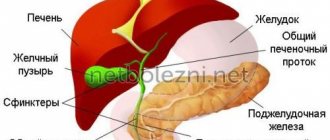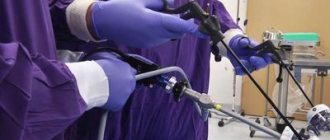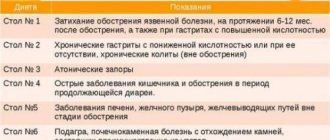Treatment of appendicitis can only be surgical. Inflammation of the appendix
(vermiform appendix of the cecum) causes severe pain in the abdomen - between the navel and the right ilium.
In this case, surgery to remove appendicitis is required, sometimes urgently. Often, inflammation of the appendix affects the body and causes sharp pain in the abdomen instantly. The appendix swells in just a couple of hours and then fills with pus. Even if the pain syndrome is temporarily alleviated, this does not mean that the disease has gone away on its own. This may occur due to necrosis of tissue and nerve fibers. If the sac of the inflamed appendix is filled with pus, then after 3-5 days it may burst, and the pus will spread in the abdominal cavity. Therefore, at the first signs of appendicitis you should consult a doctor.
WHEN IS TREATMENT FOR APPENDICITIS REQUIRED?
Acute appendicitis requires immediate surgical treatment. Symptoms of appendicitis are severe pain in the right iliac region of the abdomen. Sometimes pain can be localized to other areas, making diagnosis difficult. In some cases, vomiting and fever are observed. Delay in surgery may lead to the development of peritonitis. Fortunately, modern surgery to remove the appendix allows you to avoid dangerous pathologies. In addition, endoscopic appendectomy leaves virtually no marks on the anterior abdominal wall, i.e., on the abdomen.
Surgery to remove appendicitis is a way to solve the problem once and for all.
What health problems may occur in people who have had their appendix removed?
Several decades ago, many doctors did not doubt the uselessness of the appendix. This belief has led to patients even having it removed for preventive purposes. This practice became widespread among the military and polar explorers going on long expeditions; in the USA at one time it was “fashionable” to have the appendix removed prophylactically for children. However, since the mid-2000s, a number of studies have been conducted proving that it is not worth getting rid of a non-inflamed appendix “just in case.”
Question and Answer Can seeds and pits cause appendicitis?
In 2007, the Duke University Medical Center in Durham, North Carolina, US, published a paper with some evidence that the appendix has a very important role in the functioning of the immune system. According to scientists, the vermiform appendix of the cecum contains beneficial bacteria that form the intestinal microflora and, in the event of activation of pathogenic or conditionally pathogenic flora, acts as a kind of incubator for beneficial microorganisms. And human immunity, in turn, directly depends on the quality and quantity of intestinal microflora.
Many subsequent studies confirmed these data. “Removing the appendix increases the likelihood of weakening the body's immune defenses. This was proven by the example of the American military in Vietnam, when they had their appendix removed,” says gastroenterologist, hepatologist, candidate of medical sciences Sergei Vyalov.
A number of scientists believe that after an intestinal infection, people without an appendix develop intestinal dysbiosis (dysbiosis) more often than those who have preserved the appendix.
Other studies show the possibility of more dangerous consequences. For example, in 2022, scientists from two universities in Taiwan concluded that decreased immunity after appendectomy in women may become an additional risk factor for the development of systemic lupus erythematosus. Having studied data from patients who underwent surgery to remove the appendix from 2000 to 2011, doctors found that surgical treatment of appendicitis can increase the risk of developing this autoimmune disease by 2.04-2.27 times. Another study the same year by researchers at three universities and doctors at two hospitals in Taiwan found that appendectomy may increase the risk of chronic kidney failure, especially in diabetic patients. Researchers also associate this side effect with disruption of the intestinal microflora after removal of the appendix.
Monkey in the stomach. 7 myths about appendicitis debunked by a surgeon Read more
Symptoms of appendicitis
- Severe and sharp pain in the abdomen, which is localized in the lower abdomen on the right side closer to the groin area - that is where the appendix is located (in the lower intestine). The pain syndrome, however, can spread throughout the entire abdominal cavity.
- High temperature, fever;
- Bloating;
- Nausea;
- No appetite.
Before surgery to remove appendicitis, it is not recommended to apply a heating pad or heat to the abdomen, or take strong painkillers. You can apply cold to the right side of the abdomen, bed rest is recommended.
Characteristic signs of appendicitis
Experts identify several main symptoms that will help identify inflammation of the appendix. If you have appendicitis, which side does your stomach hurt on ?
First of all, it is an acute and sharp pain in the right side of the abdomen, mainly in the lower part. Sometimes the pain can spread to the entire abdominal cavity, to the back and even to the ribs.
appendicitis, where it hurts
Secondary symptoms of appendicitis in men and women:
- Frequent tingling and discomfort in the lower abdomen.
- Pain when pressing.
- Bloating.
- Stomach pain, indigestion, hard stools or, conversely, diarrhea.
- A characteristic indicator is a greenish complexion, frequent nausea, and vomiting after eating.
- Unstable body temperature.
The above signs of appendicitis in adults are the most common complaints of patients with suspected inflammation of appendicitis. If you find even a few of these characteristics in yourself, you should make an appointment with a gastroentorologist or contact our clinic, where experienced and qualified doctors, using high-tech equipment, will conduct the necessary examinations to identify and get rid of the disease.
Laparoscopic appendectomy
This operation is considered the “gold standard” for the treatment of appendicitis. Laparoscopic appendectomy takes place under general anesthesia and virtually eliminates blood loss, minimizing tissue trauma. Access to the inflamed appendix is not through “open” abdominal incisions, but through 3 small punctures (about 8-10 mm). The appendix is removed with special endoscopic instruments equipped with miniature forceps, a flushing channel and a video camera. The surgeon works in front of a high-resolution video monitor - the image on the screen is magnified many times, which ensures accuracy and eliminates the risk of complications. A laparoscopic appendectomy lasts about 1 hour. The hospitalization period is 1 day—we discharge patients home the very next day after surgery. Recovery is easy, painless and quick. A person can return to normal life within the next few days. There are no specific recommendations or restrictions. After endoscopic surgery to remove appendicitis, no noticeable scars remain on the body.
How to reduce post-operative pain
Experts include the following tasks for postoperative pain management:
- quality recovery period,
- acceleration of rehabilitation and discharge from hospital,
- reduction in the number of complications, including the development of chronic postoperative pain.
The most effective is the so-called multimodal scheme4 of postoperative pain relief, the concept of which involves the use of an optimal combination of drugs from different groups in minimal doses4.
Groups of drugs that are used as painkillers after surgery:
- Opioid analgesics. Traditionally, they were considered the basis for surgical anesthesia, but their isolated use gives the expected result in only 25-30% of cases4, and the introduction of the maximum effective dose is associated with a high risk of side effects4, including respiratory depression. Also, after their withdrawal, even greater pain sensitivity often occurs.
- Nonsteroidal anti-inflammatory drugs (NSAIDs). The formation of postoperative pain syndrome is directly related to tissue injury and inflammation. Therefore, the prescription of NSAIDs, as drugs that have a powerful anti-inflammatory and analgesic effect, is indicated from the first minutes after surgery, and sometimes during surgery.
They act directly on the cause of the development of hypersensitivity, namely the production of prostaglandins and other biologically active substances involved in the inflammatory process. There are methods that suggest using NSAIDs 20-30 minutes before the incision, which can reduce the intensity of pain in the area of postoperative sutures.4
When prescribed with drugs from the previous group, NSAIDs make it possible to reduce the dose and enhance the effect of opioids and prevent their side effects4.
- Non-opioid centrally acting painkillers. They do not affect the mechanisms of inflammation, but are able to suppress secondary increased pain sensitivity at the level of transmission of nerve impulses. Their use half an hour before the end of the operation ensures a calm and painless awakening after anesthesia4. They have proven themselves well in complex pain relief.
- Drugs that affect the perception of pain. Introduced to prevent hypersensitivity and the development of chronic pain syndrome4.
- Regional anesthesia (analgesia). The application of the method is based on interrupting the flow of pain impulses from the damaged area to the spinal cord and brain4.
For each patient, a comprehensive pain relief regimen is selected individually. Factors such as age, gender, extent of surgical intervention, concomitant pathology, mental characteristics, sensitivity to pain and its presence before surgery are taken into account.
Up to contents
Recovery after appendectomy
As we have already noted, after laparoscopic surgery there is no rehabilitation as such - it is not required. After a traditional appendectomy, the patient may experience discomfort for 1-2 weeks, so rest in a calm environment is necessary. It is important to follow all the recommendations of your doctor, in this case the recovery will be most favorable. For some time after surgery to remove appendicitis in the traditional way, you should refrain from physical activity and not take a bath. In general, the postoperative period is tolerated mildly.
Should I be concerned about my health after having my appendix removed?
However, there are other statistics that are not so frightening. For example, scientists from the Danish city of Gerleva, after examining data obtained from 37 studies, did not establish a link between appendectomy surgery and the development of various complications and diseases in the future, including hernia, inflammatory bowel disease, cancer and infertility.
Despite the fact that most patients will never face the possible consequences of appendix removal, modern doctors believe that this operation should be performed only if necessary. According to Sergei Vyalov, the only indication for removal of the appendix is acute appendicitis, and inflammatory processes in the intestines are treated with medications.
Advantages of treating appendicitis at the Pirogov Clinic
- a team of experienced surgeons and doctors of the highest category;
- positive feedback from patients regarding appendicitis removal;
- performing operations using modern minimally invasive techniques that significantly speed up recovery and provide a good aesthetic effect;
- reasonable prices for surgery to remove appendicitis;
- own laboratory: test results - quickly and with a guarantee of reliability;
- equipping operating rooms with the most advanced medical equipment from leading Western companies;
- attentive and responsible medical staff: a team of anesthesiologists, resuscitators, assistants and nurses coordinately and quickly resolves any issues around the clock;
- the highest standards of equipment sterility and patient safety, meeting the requirements of regulatory authorities;
- use of the latest generation of anesthesia that does not cause any discomfort after the intervention;
- modern comfortable rooms: you feel like you are in a European hotel room;
- quick return to normal life: as a rule, patients are discharged the very next day after the intervention;
- for patients from other cities - organizational assistance from a curator at all stages of treatment;
- online consultations with surgeons.
If you have symptoms of appendicitis, do not waste time!
Make an appointment










